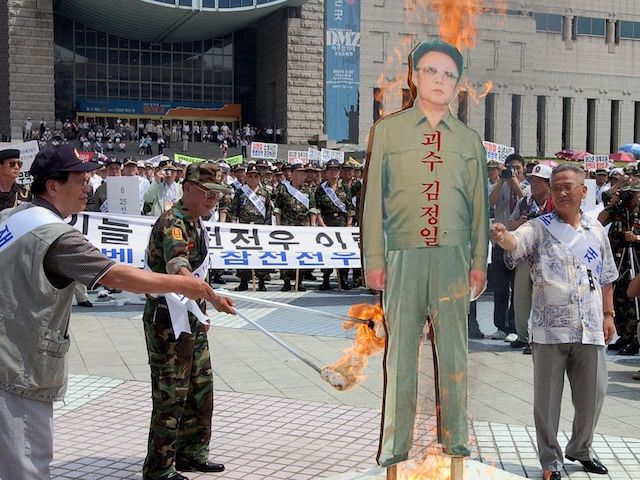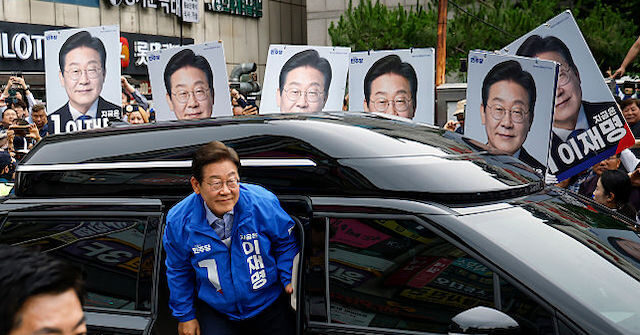Leftist South Korean President Lee Jae-myung told reporters during a press conference on Thursday that he was hoping to improve Seoul’s relationship to communist North, and its patrons in China and Russia, in pursuit of a definitive state of peace on the peninsula.
Lee conceded that any moves to bring Seoul closer to Pyongyang would require coordination with the United States and the administration of President Donald Trump, as the U.S. is an active participant in the situation on the Korean peninsula.
The South Korean president made the remarks during a press conference marking his first month in office. Lee, of the left-wing Democratic Party, became the country’s head of state after a tumultuous six months in which his predecessor and successful rival in the 2022 presidential election, Yoon Suk-yeol, was impeached and ousted over an attempt to impose martial law. Yoon governed as a hardline conservative, prioritizing friendly relations with America at a time during which the White House, occupied by Joe Biden, paid little attention to either Korea. Yoon finally succeeded in getting Biden to send a nuclear-powered submarine to southern Busan in 2023, in a show of force against the North, after suggesting that South Korea could soon “possess its own nukes” if it continued feeling insufficiently protected from Pyongyang’s threats.
Relations between South Korea and Russia also soured under Yoon as the latter vocally advocated for support for Ukraine against Moscow’s ongoing invasion, warning the West repeatedly that North Korea posed a similar threat to the South as Russia did to Ukraine. Russia and North Korea signed a mutual defense treaty in June 2024 that preceded the presence of thousands of North Korean troops fighting against Ukraine.
The relationship between Lee and Trump, which has not yet had time to develop in any significant way, is ideologically the reverse of what South Korea experienced with Yoon and Biden. Lee vowed on his first day in office to pursue peace and dialogue with the brutal communist regime in North Korea and has since identified China as a priority nation for diplomacy.
“Peace is the minimum prerequisite for national stability and happiness,” Lee told reporters, according to the South China Morning Post, which reported that he said he would work “swiftly” to strengthen his country’s relationships with China and Russia. Lee asserted that doing so, as well as reaching out to North Korea, would help fuel what he described as a “virtuous cycle of peace” that would hopefully eliminate the threat of war for his people.
The Chinese Communist Party moved rapidly in June to ingratiate itself with the new Lee administration. Genocidal dictator Xi Jinping sent Lee a personal letter offering his help in bolstering the bilateral relationship and celebrating “good-neighborliness and friendship.”
“Over the past 33 years since the establishment of diplomatic relations, the two countries have risen above the differences in ideology and social systems,” Xi told Lee, according to the Chinese Foreign Ministry, “moved forward hand in hand and helped each other succeed, achieving steady and sound growth in bilateral relations.”
The Chinese government reportedly invited Lee to attend its celebrations marking the end of World War II in September. The conservative South Korean newspaper Chosun Ilbo reported on Wednesday that Lee’s office has confirmed that the two countries are “in communication” about Lee joining the festivities, but did not indicate if Lee had formally accepted. The newspaper noted that attending could exacerbate tensions with Japan, as China calls World War II the “War of Resistance Against Japanese Aggression” and its celebrations actively highlight the role of Imperial Japan in the conflict.
People visit an exhibition on the Battle of Stalingrad at the Museum of the War of the Chinese People’s Resistance Against Japanese Aggression to commemorate the 76th Anniversary of the end of World War II on September 3, 2021 in Beijing, China. (Fu Tian/China News Service via Getty Images)
During the press conference on Thursday, Lee also expressed hope that his country’s relationship with North Korea, with which it remains technically at war, also has room for improvement.
“We should improve relations with North Korea based on fixed coordination with the United States,” he told reporters, according to the South Korean Yonhap News Agency. “Completely cutting off dialogue is a foolish act.”
Lee has already made some minor concessions to the North, the first among them being an end to loudspeaker broadcasts on the border. South Korea has for decades placed large loudspeakers on its side of the border and used them to broadcast content noxious to the communist regime, including global news updates that do not conform to state propaganda, facts about the reality of the communist regime, and South Korean pop music (K-pop). The previous leftist president, Moon Jae-in, had suspended the broadcasts, the Yoon restored them upon taking office in 2022.
“When we decided to suspend the loudspeaker broadcasts toward North Korea, I was concerned about how quickly — or even whether — they would respond,” Lee conceded on Thursday. “But (the North’s) response was very swift and exceeded expectations.”
Lee expressed concern that North Korea would never accept peace with the South if it considered that there was a possibility the much wealthier and functional South would “absorb” it.
“As our Constitution states, we pursue peaceful unification,” he stated. “This is not about absorption. Who would willingly accept being absorbed?”
Lee reportedly cited the “Sunshine Policy” South Korea adopted towards the North in the late 1990s of concessions and acceptance of the regime’s deplorable human rights policies and regular threats to the South. The policy failed and immediately preceded North Korea’s nuclear weapons tests.
“Unification is still possible even hundreds of years from now,” Lee mused.

Some 3,000 veterans gathered to protest against North Korea and South Korean President Kim Dae-Jung’s “Sunshine Policy” of reconciliation towards the North, following the death of four South Korean soldiers in a clash at sea last week, on July 4, 2002. (Photo by CHOI JAE-KU / AFP)
On the United States, Lee lamented the state of current talks to reach a new trade agreement, replacing the status quo under Biden. President Trump announced a set of tariffs on every nation that trades with the United States in April, then offered the countries a deadline of July 8 to negotiate a more favorable deal for America or accept the sanctions.
“Tariff negotiations are definitely not easy,” Lee told reporters. “I can’t say for sure that we can finish by July 8. We’re doing our best right now.”
“We need to create a mutually beneficial result that is helpful to both parties, but we have not yet clearly defined what the two parties want,” he added.
Follow Frances Martel on Facebook and Twitter.
Read the full article here
